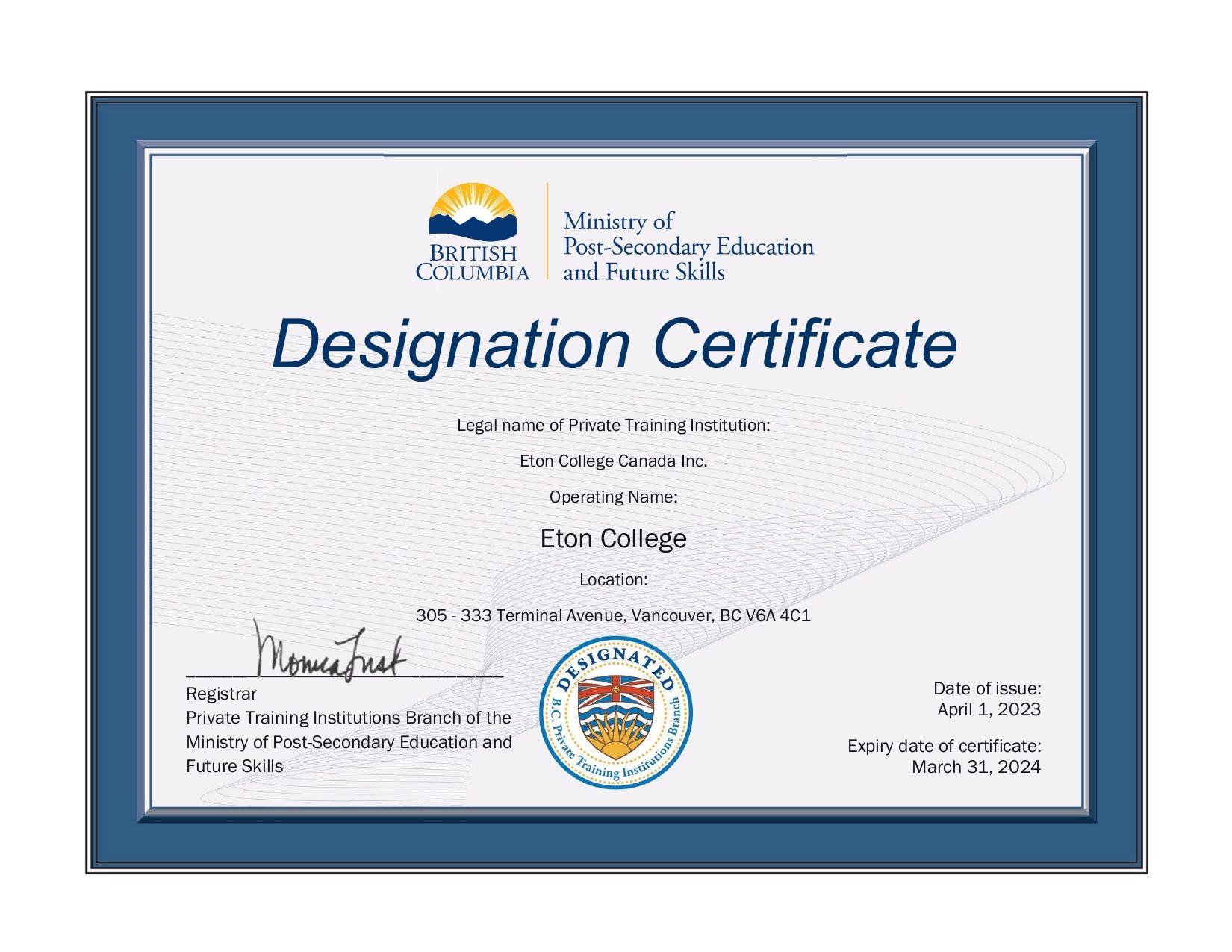- 48 Hours / 8 Weeks
- - In-class, Distance, Combined
- Certificate
Gain practical insight into identifying common computer crimes, securing digital crime scenes, collecting and preserving digital evidence, and maintaining chain of custody. Learn the fundamentals of forensic tools, data analysis, and legal standards governing electronic evidence in court. Explore topics such as cyber fraud, identity theft, hacking offenses, network intrusions, and digital privacy regulations.
Together with Eton, begin building the skills and confidence needed to contribute to the fight against cybercrime and support the integrity of digital investigations in today’s technology-driven world.
Program Advantage
- 48-Hour In-Depth Instructor-Led Training
- Comprehensive Learning Modules
- In-class, distance and via blended learning
- Guided Mentorship by Industry Experts
- 24/7 Support
At Eton College, we pride ourselves on delivering high-standard education in Vancouver, Canada. For more than 20 years, we have been proud to help 83% of our graduates to land their dream careers through our various PTIRU-certified and industry-relevant upskilling programs, specializing in Business Management, Travel and Tourism Management, Hospitality Management, Flight Attendant Preparation, Information Technology, Airport Operations, Construction, Public Administration, Healthcare, Elderly Care and Communication training.
-
Overview
- Modules
- Fees
- Admission
- Career Services
- Admission
- Career Services
PROGRAM DESCRIPTION
This 10-module program introduces students to the most common criminal offences in which a computer or network is used as a tool, target, or location of a crime. Students will develop an understanding of the creation, movement, and storage of digital information within an information technology infrastructure, as well as the methodologies used to obtain digital evidence and the legal requirements involved in the search and seizure of such evidence.
The course explores various methods used in tracing email communications and website postings, along with proper evidence collection procedures required for criminal prosecution. Upon completion, students will be able to recognize common computer crimes, locate sources of digital evidence, and understand legal search and seizure requirements during criminal investigations involving computer-related offences.
LEARNING OBJECTIVES
Upon successful completion of this course, students will have reliably demonstrated the ability to:
- Articulate how computers are used in committing criminal offences and explain the movement and storage of digital information on the internet.
- Explain criminal offences such as Defamatory Libel, unauthorized use of a computer, and threatening communications.
- Identify and locate email and website identifiers used to trace the source of digital activity.
- Trace email communications and web postings back to their origin.
- Determine when a Search Warrant should be used instead of a Production Order and explain the reasoning.
- Explain the importance of using additional investigative methods to support collected digital evidence.

| Modules | Topics |
| 1 | Foundations of Digital Forensics
Language of Computer Crime Investigation |
| 2 | Digital Evidence in the Courtroom
Cybercrime Law |
| 3 | Conducting Digital Investigations
Handling a Digital Crime Scene |
| 4 | Investigative Reconstruction with Digital Evidence
Motive, and Technology |
| 5 | Violent Crime and Digital Evidence
Digital Evidence as Alibi |
| 6 | Sex Offenders on the Internet
Computer Intrusions |
| 7 | Cyber stalking
Computer Basics for Digital Investigators |
| 8 | Applying Forensic Science to Computers
Digital Evidence on Windows Systems |
| 9 | Digital Evidence on UNIX Systems
Digital Evidence on Macintosh Systems Digital Evidence on Mobile Devices |
| 10 | Network Basics for Digital Investigators
Applying Forensic Science to Networks Digital Evidence on the Internet |
| 11 | Review |
| 12 | Final Exam and wrap up. |

| Tuition | CAD 850 |
| Course Retake | CAD 850 per course |
| Copy of Transcript | CAD 20 per copy |

Admission Requirements
To be eligible for admission, applicants must meet the following criteria:
1. Basic Admission Requirements
- High School Completion: Applicants must have a high school diploma or an equivalent qualification.
- Age Requirement: Minimum 19 years of age.
- Mature Student Status*: Applicants who have not completed high school and are at least 19 years of age may apply as a mature student.
*Mature student status may be granted to applicants who are over 19 years old and have not completed high school or equivalent. Applicants will be considered for admission based on the skills and experience they have acquired since leaving school. The applicant is required to provide the most recent transcripts or proof of academic accomplishments, a resume or summary of professional accomplishments, and two professional letters of recommendation. The applicant may be interviewed by the Registrar’s or Academic Office to further assess their suitability for admission to the program of study.
2. English Language Proficiency
Applicants must meet one of the following:
- Minimum scores from accepted English tests (e.g., IELTS 5.5, TOEFL iBT 46, Duolingo 95, etc.).
- Recent English proficiency test (within 2 years).
- Proof of English-language education:
- 2–3 years of secondary or post-secondary education completed in English in eligible countries.
- International credentials must be recognized by WES, ICES, or IQAS.
Please see the Admission Requirements Guide for more information
.

Career Services
Success beyond the classrooms at Eton College!
Land your dream job through our career services:
- Career Seminars and Workshops
Get career-ready through our insightful workshops and seminars with industry experts to master the skills you need to land your dream job.
- 1:1 Professional Resume and Portfolio Building
Market yourself like a pro by developing and refining stellar resumes, portfolio, and online profiles with a dedicated career advisor.
- Mock Interviews & Coaching
Experience interactive mock interviews and coaching sessions, led by our career advisors, to build confidence and hone interview skills.
- Skillset Discovery
Let our expert career advisors help you identify your key strengths and skills tailored to your personal brand and desired careers.



We are PTIRU-Certified!

Our Alumni Network
All Hospitality Programs
- Gulf of Georgia Cannery National Historic Site
- Holiday Inn Express
- Wedgewood Hotel & Spa
- Best Western King George Inn & Suites
- Rainbow Travel Inc
- H.I.S travel agency
- Vancouver International Travel Expo
- Element Hotels
- Sandman Hotels Group
- Rocky Mountaineer
- McDonald's
- Delta Hotels by Marriott
- Vancouver Aquarium

